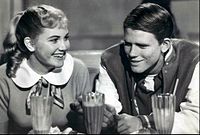Richie Cunningham
| Richard Cunningham | |
|---|---|
 | |
| First appearance | "Love and the Happy Days" |
| Last appearance | "Passages Part 2" |
| Created by | Garry Marshall |
| Portrayed by | Ron Howard |
| In-universe information | |
| Nickname | Richie |
| Gender | Male |
| Occupation | Reporter, Soldier, Screenwriter |
| Family | Joanie Cunningham (sister), Marion Cunningham (mother) Howard Cunningham (father) Chuck Cunningham (brother) |
| Spouse | Lori Beth Cunningham (wife) |
| Children | Richard Cunningham Jr. (son) |
| Relatives | Roger Phillips (cousin) Flip Phillips (cousin) KC Cunningham (cousin) Sean Cunningham (grandfather) Charles "Chachi" Arcola (brother-in-law) |
Richard J. "Richie" Cunningham is a fictional character played by Ron Howard on the sitcom Happy Days.[1] He was the brother of Joanie Cunningham and Chuck Cunningham, and friend to Fonzie, Ralph Malph, and Potsie.[2] Cunningham was the original lead character, but was supplanted by Fonzie when that character's popularity came to dwarf that of Cunningham's and the other characters.[3][4][5]
Character traits
Richie Cunningham was the quintessential example of the white All-American, 1950s teenager.[6] He was exceedingly wholesome and, with his red hair and freckles, he bore more than a passing resemblance to Howdy Doody. Occasionally he got into trouble, usually in some scheme designed to attract women, but he did not seem to have a malicious bone in his body.
Many of the episodes revolved around Richie's attempts to pick up women,[2] and there was little that the clean-cut teen would not do to land a date. If buying a new car or joining a local gang was what it took, Richie was ready to give it a shot. Whenever he was feeling particularly lucky—especially when he spotted a prospective girlfriend—he would sing Fats Domino's, "I found my thrill... on Blueberry Hill". On the occasions that he would become angry or annoyed, he would call any opponents "bucko," even going as far as calling The Fonz this on several occasions.
Richie also harbored an enormous ambition as a writer. He first wrote for the Jefferson High Bugle, and then later became a cub reporter for the Milwaukee Journal, although in the first season episode "Because She's There" he told his blind date, Phyllis, that he wanted to eventually go to law school and become a lawyer.
Throughout the show's run, Richie remained best friends with Fonzie, Ralph Malph, and Potsie Weber. He was always ready to help any of these friends if they got into trouble and also looked after his younger sister Joanie as she grew up. In the first season it was referred to that he and Potsie were best friends and grew up together since childhood; this was alluded to again in the seventh season episode, "A Potsie Is Born."
After high school, Richie went to the University of Wisconsin–Milwaukee and soon met his girlfriend and future wife Lori Beth in a library. Richie studied journalism at the university and always remained alert for any opportunity to further his writing career.
After graduating from the University of Wisconsin–Milwaukee, he served a short stint in the U.S. Army and was stationed in Greenland. While overseas, he married his long-time girlfriend Lori Beth by telephone, with the Fonz standing in as proxy for the absent Richie. Lori Beth visited Richie in Greenland long enough to get pregnant. Their son was very aptly named Richie Jr.
In the final season of the series, Richie returned to his dream of becoming a writer and moved to Hollywood with Lori Beth and his child to find work as a screenwriter.
Cultural references
In Austin Powers: International Man of Mystery, Austin, going undercover, goes by the alias "Richie Cunningham".
References
- ^ ""Happy Days:" Why Richie and the Fonz aren't suing". CBS News. April 20, 2011.
- ^ a b Brant, Marley (2006). Happier Days: Paramount Television's Classic Sitcoms, 1974-1984. New York: Billboard Books. p. 37. ISBN 0-8230-8933-9.
- ^ Waters, Darren (August 12, 2004). "Remembering Happy Days". BBC News. (BBC). Retrieved August 28, 2011.
- ^ "From failure to Fonz – actor Winkler aims to inspire". Reuters. April 27, 2007. Retrieved August 16, 2010.
- ^ Haithman, Diane (January 4, 1991). "Is Uncool Urkel the '90s Answer to the Fonz?". The Los Angeles Times. Retrieved November 7, 2010.
- ^ Slocum, Beth (August 18, 1974). "'Happy Days' Stars". The Milwaukee Journal.
